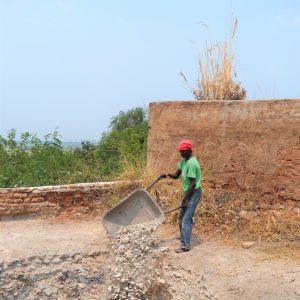Date: April 2018 to July 2018
Raw Materials: 3Ts and gold
Location: China
Project background
The Sustainability in Chinese Outbound Mining Investment- Sustainable Mining Action Plan (SMAP) project was funded by the UK Department for International Development (DFID) and implemented jointly by the China Chamber of Commerce of Metals, Minerals and Chemical Importers and Exporters (CCCMC) and the German Agency for Technical Cooperation (GIZ).
The project was conceived to support the practical implementation of the Guidelines for Social Responsibility in Outbound Mining Investments as well as the separate Chinese Due Diligence Guidelines for Responsible Mineral Supply Chains. Both were formulated by CCCMC. The Chamber is also leading their implementation on behalf of the Government of the People’s Republic of China.
Challenge: aligning agencies from three different countries and cultures
SMAP represented a very ambitious and innovative agenda, bringing together agencies from three countries to encourage greater responsibility in mineral supply chains involving Chinese companies. Aligning project objectives and ways of working with a shared vision of success proved difficult during the initial period of project design and implementation. In response, the three partners agreed that the project logframe should be revised to ensure it fully integrated their respective objectives.
Levin Sources was contracted by GIZ to facilitate this process. The challenge was to achieve greater shared ownership of and commitment to the revised document as the guiding framework for the remainder of the implementation period.
Solution: careful facilitation and training
An initial review of progress revealed that while all three partners were committed to the overall vision, there were important concerns about some of the project’s outcomes, how these should be delivered and on what basis success should be assessed. The project logframe, which was meant to articulate a shared approach to delivery, was instead a source of misunderstanding and frustration.
The Levin Sources team realised early on that the review process could exacerbate this situation. The team therefore focused its first visit to Beijing on establishing a common understanding of the review process, including the essential principles of listening, joint working and mutual respect. An initial discussion of output indicators also helped to establish a clearer sense of where the main disagreements lay.
The second visit was combined with capacity building sessions on the concept of ‘Theory of Change’ (with support from the ISEAL Alliance) to further build shared understanding of successful joint project steering and delivery. In parallel, detailed discussions about project activities, outputs, outcomes and impact took place – separately with the three partners and in plenary. These required compromises on all sides but eventually resulted not only in a detailed revised logframe but also a stronger sense of shared purpose and collaboration.
Results: an approved logframe
The final revised logframe and accompanying documents were presented to the CCCMC, DFID and GIZ teams during a final plenary discussion in Beijing, and agreed by all. The logframe was subsequently approved by senior managers in all three organisations.
The project team faced unique challenges in bringing all three partners together around a set of project management tools that are not widely used in China. With the combination of careful facilitation and training, they created an environment that enabled everybody to openly express their concerns and aspirations and combine these in a revised project logframe that was fully supported by all parties.







